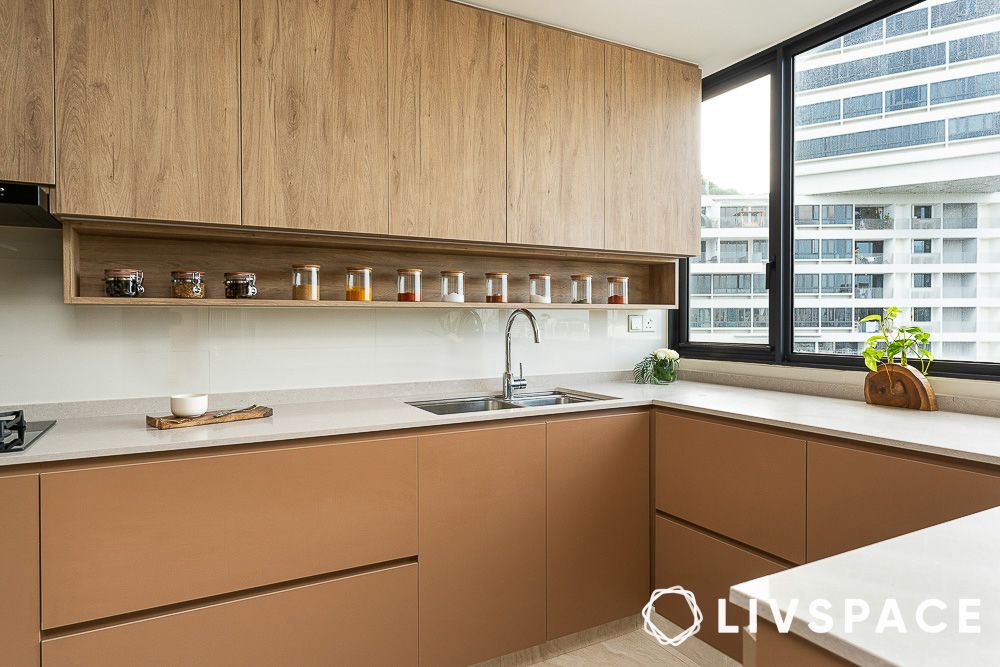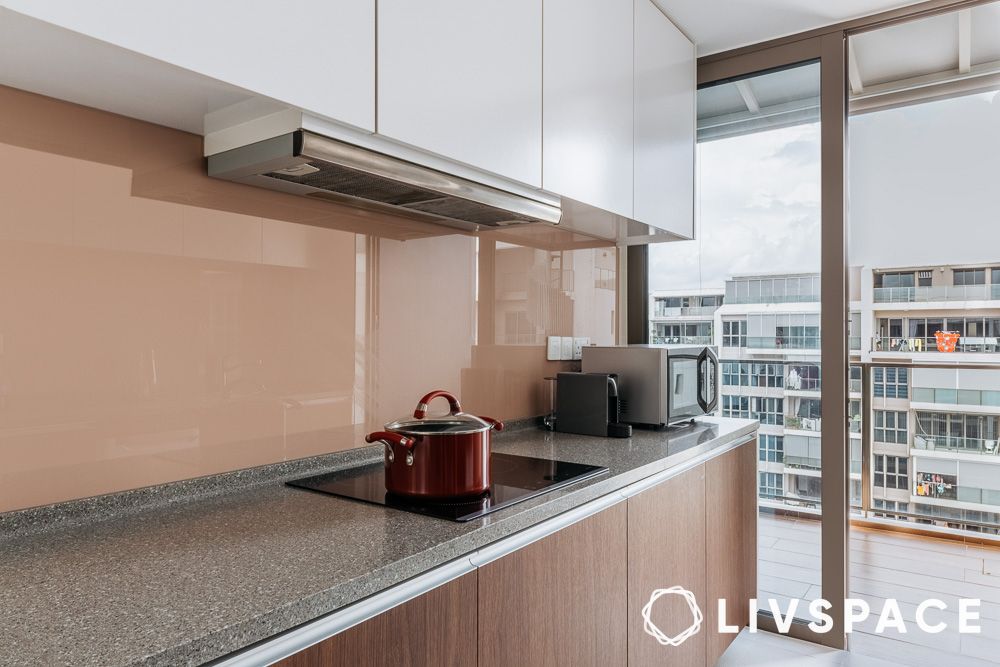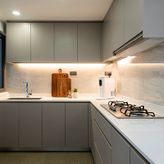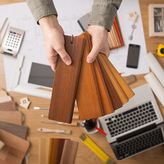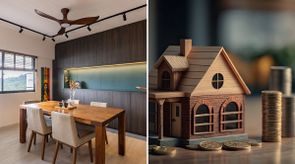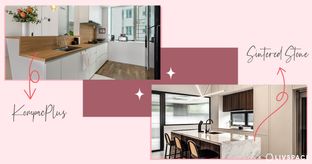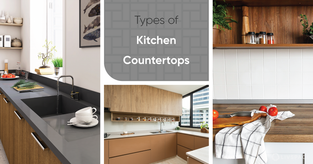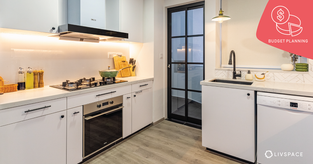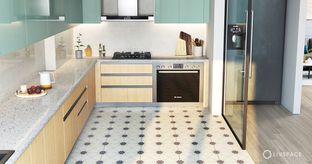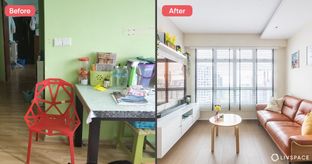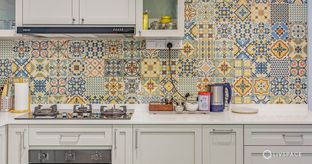In This Article
- How much do kitchen countertop materials cost?
- Kitchen countertop materials #1: Engineered quartz
- Kitchen countertop materials #2: Sintered stone
- Kitchen countertop materials #3: Terrazzo
- Kitchen countertop materials #4: Marble
- Kitchen countertop materials #5: KompacPlus
- Kitchen countertop materials #6: Granite
- Kitchen countertop materials #7: Solid surface
- Kitchen countertop materials #8: Stainless steel
- Kitchen countertop materials #9: Wood
- Kitchen countertop materials #10: Soapstone
- How can Livspace help you?
Welcome to the ultimate countertop showdown, where every slab tells a story of style, functionality, and flair! From the sleek sophistication of quartz to the rustic charm of wood, the quest to find the perfect kitchen countertop materials is on. Get ready to explore a world of possibilities as we dive into the realm of design and functionality. Your culinary kingdom awaits its crowning jewel—let the countertop crusade begin!
How much do kitchen countertop materials cost?
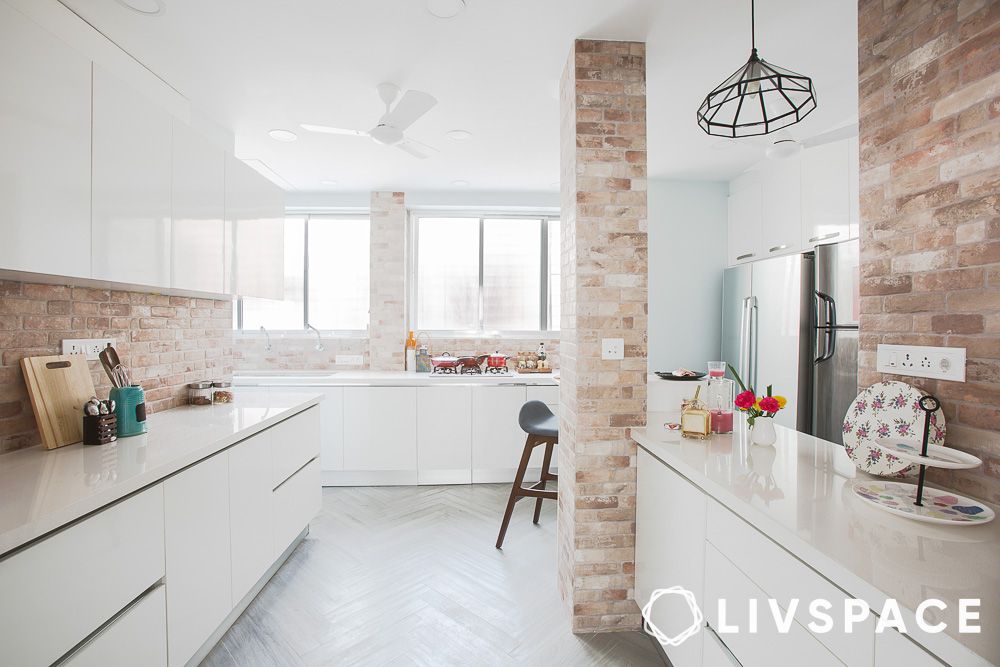
First things first, how much will a kitchen countertop cost? Here’s a price range of the most commonly used kitchen countertop materials:
| Material | Minimum requirement | Price range (before GST)* (all prices are per foot run) |
| Engineered quartz | 3 feet | <700mm depth: S$91.47 to S$213.42 <900mm depth: S$149.39 to S$320.14 <1200mm depth: S$182.94 to S$426.85 |
| Sintered stone | 3 feet | <700mm depth: S$180.41 to S$270.62 <900mm depth: S$270.62 to S$405.93 <1200mm depth: S$360.83 to S$541.24 <1600mm depth: S$451.03 to S$676.55 |
| Terrazzo | 6 feet | <550mm depth: S$157.86 to S$165.38 <850mm depth: S$233.03 to S$248.07 <1150mm depth: S$315.72 to S$330.75 |
| Marble | 5 feet | <700mm depth: S$210.48 to S$436 <900mm depth: S$315.72 to S$496.14 <1200mm depth: S$270.62 to S$556.28 |
| KompacPlus | 5 feet | <450mm depth: S$86.9 to S$129.58 <600mm depth: S$111.28 to S$157.02 <800mm depth: S$135.68 to S$184.46 <1200mm depth: S$160.07 to S$213.42 |
| Granite | 5 feet | <700mm depth: S$106.72 to S$213.42 <900mm depth: S$160.07 to S$320.14 <1200mm depth: S$213.42 to S$426.85 |
| Solid surface | 5 feet | <700mm depth: S$91.47 to S$213.42 <900mm depth: S$149.39 to S$320.14 <1200mm depth: S$182.94 to S$426.85 |
Now that we’ve the costs locked down, let’s explore the different materials and their characteristics.
Kitchen countertop materials #1: Engineered quartz
Engineered quartz has emerged as a game-changer in the realm of interior design and renovation, captivating designers and homeowners alike with its unparalleled beauty and durability. A prime example of technological ingenuity, engineered quartz blends 93% ground quartz crystals with 7% resins and pigments to create slabs of extraordinary strength and resilience. This meticulous combination results in countertops that not only withstand the test of time but also resist stains and scratches with ease.
| Pros | Cons |
| Durability: Quartz kitchen countertops are highly durable and resistant to scratches, stains, and impacts, making them suitable for high-traffic areas like kitchens. | Susceptibility to chemical damage: Harsh chemicals and abrasive cleaners can damage the surface of quartz kitchen countertops, so it’s important to use mild, non-abrasive cleaners for maintenance. |
| Low maintenance: Quartz kitchen countertops are non-porous, making them easy to clean and maintain. They do not require sealing and are resistant to bacteria and mould growth. | Not completely heat-resistant: While quartz kitchen countertops can withstand moderate heat, exposure to high heat can cause damage like cracking or discolouration. Make sure to use wooden bases when placing a hot utensil on the counter. |
| Variety: Quartz countertops come in a wide range of colours, patterns, and finishes, allowing homeowners to choose a style that complements their kitchen design. | Cost: Quartz countertops can be more expensive than other materials like laminate or tile, making them less budget- friendly for some homeowners. |
| Uniformity: Unlike natural stone, quartz countertops have a consistent appearance throughout the slab, offering a more uniform look for kitchen surfaces. |
Also Read: Exploring Kitchen Renovation Costs in Singapore: From S$15,000 to S$40,000
Kitchen countertop materials #2: Sintered stone
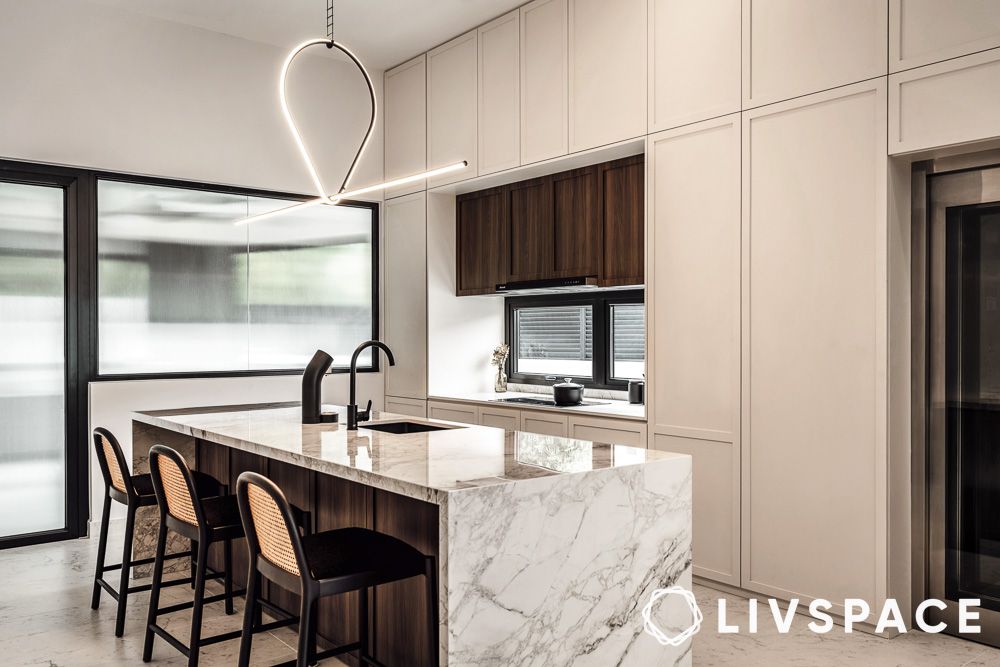
The sintered stone represents a revolutionary advancement in countertop materials. Created entirely from minerals using a sophisticated high-temperature process, it diverges from conventional options by eliminating the need for binders. Through the fusion of minerals alone, sintered stone achieves dense and compact surfaces uniformly. This exceptional construction ensures unparalleled durability, rendering sintered stone countertops resistant to scratches, stains, and impacts.
| Pros | Cons |
| Exceptional durability: Sintered stone countertops are highly resistant to scratches, stains, and impacts, ensuring long-term durability. | Cost: Sintered stone countertops tend to be more expensive than some other countertop materials due to their advanced manufacturing process and premium quality. |
| Heat resistance: They can withstand high temperatures without damage, making them suitable for use near stovetops and other heat sources. | Weight: They are heavier than natural stone and some other materials, requiring sturdy support structures during installation. |
| Low porosity: Sintered stone surfaces are non-porous, preventing the absorption of liquids and making them hygienic and easy to clean. | Limited repairs: While highly durable, sintered stone countertops may be challenging to repair if they do sustain damage. |
Also Read: KompacPlus vs Sintered Stone: A Comprehensive Comparison for Homeowners
Kitchen countertop materials #3: Terrazzo
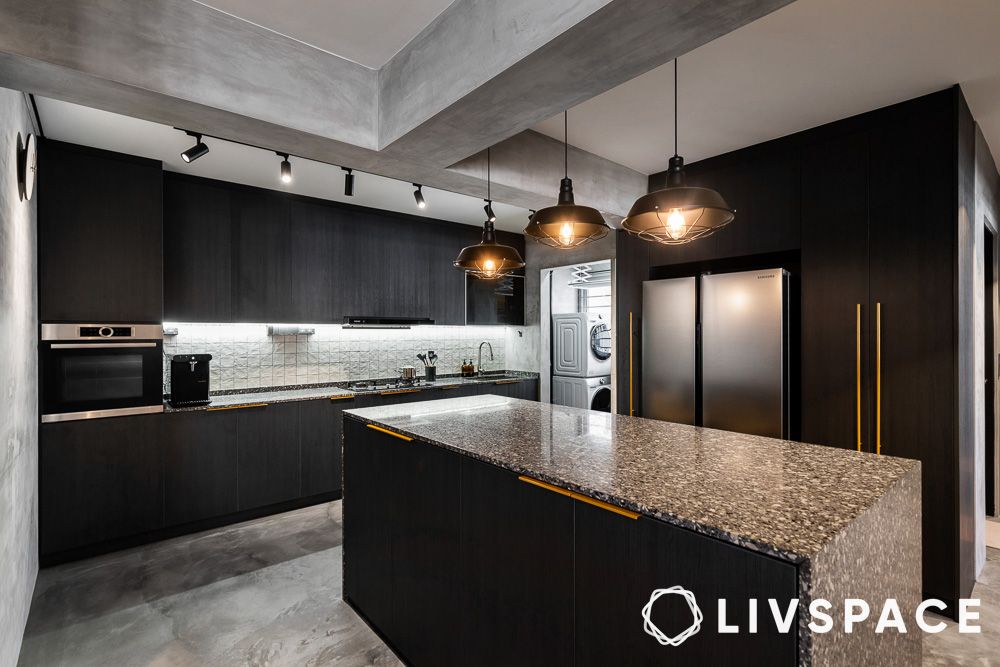
Terrazzo countertops are a unique and stylish choice for kitchen surfaces, crafted from a blend of marble, granite, or glass fragments embedded in concrete or mortar. This material undergoes a meticulous process, starting with grinding small chips of stone and mixing them with a cementitious or resin-based binder. The resulting mixture is poured into moulds, left to solidify, and then polished to perfection, revealing a sleek and glossy finish. Terrazzo countertops boast a distinctive appearance characterised by speckles and veins, adding character and elegance to any kitchen space.
| Pros | Cons |
| Unique aesthetic: Terrazzo countertops offer a distinctive and eye-catching appearance with a blend of marble, granite, or glass chips, adding character to any kitchen. | Susceptible to cracking: While durable, terrazzo countertops may develop hairline cracks over time, especially if exposed to heavy impact or shifting foundations. |
| Environmentally friendly: Utilises recycled materials, such as post-consumer glass and stone chips, making it an eco-friendly option. | Cost: Terrazzo countertops can be more expensive compared to other materials due to the intricate manufacturing process and premium materials used. |
| Durable: Terrazzo is a durable material that can withstand heavy use and is resistant to scratches, stains, and heat. | Porous surface: Traditional terrazzo can be porous, making it susceptible to staining if not properly sealed and maintained. |
Also Read: Our Top 10 Fabulous HDB Kitchen Renovation Tales You Shouldn’t Miss!
Kitchen countertop materials #4: Marble
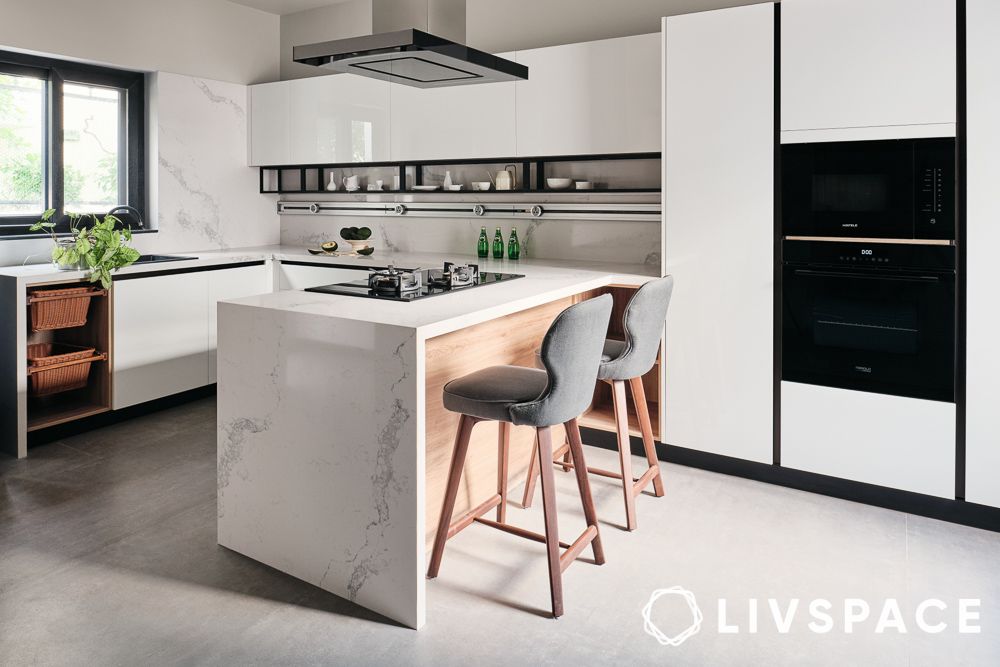
Renowned for its luxurious appearance, marble countertops add a touch of opulence to any kitchen space. Beyond aesthetics, marble offers remarkable durability, standing the test of time with proper care.
| Pros | Cons |
| Cool surface: Marble remains cool to the touch, making it ideal for cooking and baking. | Porous nature: Marble is prone to staining and etching from acidic substances like lemon juice, vinegar, and wine. |
| Timeless elegance: Marble’s natural beauty and unique veining patterns add a touch of timeless elegance to any kitchen space. | High maintenance: Marble countertops require regular sealing and maintenance to protect against stains, scratches, and etching. |
| Increase property value: Marble countertops are highly desirable and can increase the resale value of your home. | Cost: Marble is a premium natural stone, making it relatively expensive compared to other countertop materials. |
Kitchen countertop materials #5: KompacPlus
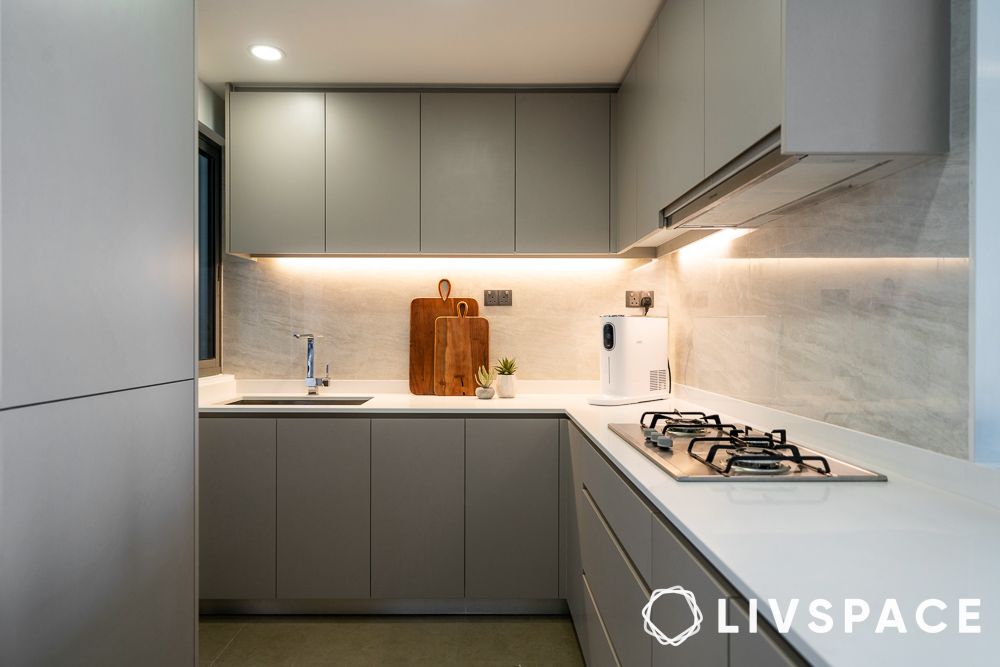
KompacPlus, a revolutionary surfacing material, redefines the concept of kitchen countertops with its innovative composition and exceptional performance. Crafted from layers of craft paper and resin, KompacPlus undergoes a high-pressure and high-temperature process to achieve its remarkable durability and versatility.
| Pros | Cons |
| Durability: KompacPlus is highly durable, making it resistant to scratches, stains, and impact damage, ensuring longevity and minimal maintenance. | Discolouration risk: Over time, KompacPlus surfaces may be prone to discolouration, requiring regular maintenance to preserve their appearance. |
| Non-porous surface: It’s non-porous nature prevents the absorption of liquids, reducing the risk of stains, mould, and bacterial growth, ensuring hygiene and easy cleaning. | Visible seam joints: The presence of visible seam joints in KompacPlus installations may affect the overall aesthetic appeal, particularly in large countertop areas. |
| Aesthetic variety: With a wide range of colours, textures, and finishes available, KompacPlus offers versatility in design, allowing for customisation to suit diverse aesthetic preferences and kitchen interior design styles. | Limited designs: Despite its versatility, KompacPlus may have fewer design options compared to other materials, potentially limiting choices for some homeowners. |
Also Read: 6 Best Kitchen Layouts for a Flawless Cooking Experience
Kitchen countertop materials #6: Granite
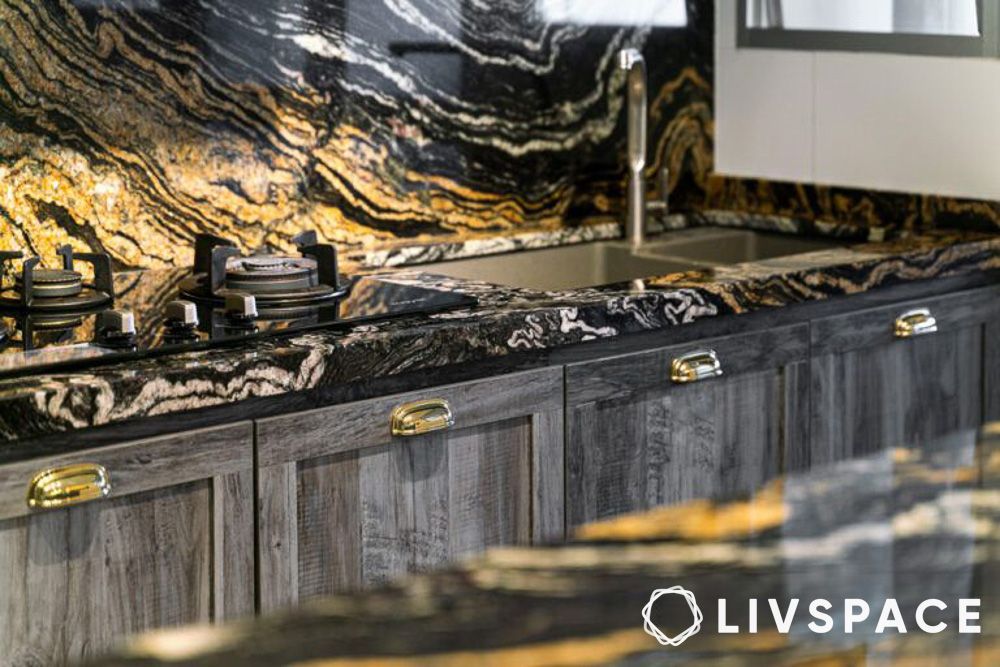
Granite, a natural stone revered for its timeless beauty and unparalleled durability, stands as a stalwart choice for kitchen countertops. Its characteristic veining and speckling add depth and dimension to any kitchen space, infusing it with a sense of luxury and sophistication.
| Pros | Cons |
| Durability: Granite is highly durable and resistant to scratches, heat, and stains, making it ideal for high-traffic areas like kitchens. | Cost: Granite countertops can be expensive, especially for premium grades and rare colours. |
| Longevity: Granite countertops can last a lifetime with proper care and maintenance, offering excellent value for money. | Maintenance: While durable, granite requires periodic sealing to maintain its resistance to stains and moisture. |
| Resale value: Installing granite countertops can increase the resale value of your home, making it an attractive investment. |
Kitchen countertop materials #7: Solid surface
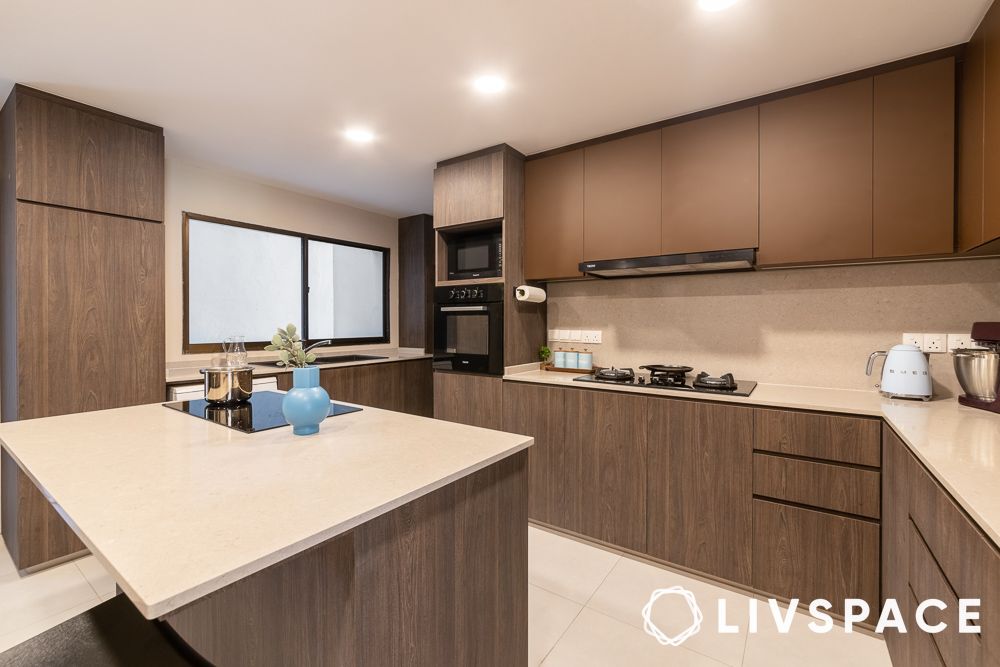
Solid surface countertops are a contemporary marvel, crafted from a blend of resins, pigments, and fillers. This engineered material offers versatility in design, allowing for the creation of seamless 3D curves and custom shapes.
| Pros | Cons |
| Versatility: Solid surface countertops offer endless design possibilities, including seamless 3D curves and custom shapes. | Susceptible to heat damage: Can be damaged by hot pots and pans, requiring the use of trivets or hot pads. |
| Non-porous: Resistant to stains, moisture, and bacterial growth, making them hygienic and easy to clean. | Prone to scratching: While scratches can be repaired, solid surface countertops are more prone to scratching than harder materials. |
| Repairable: Scratches, chips, and stains can be easily repaired, maintaining the countertop’s appearance over time. |
Kitchen countertop materials #8: Stainless steel
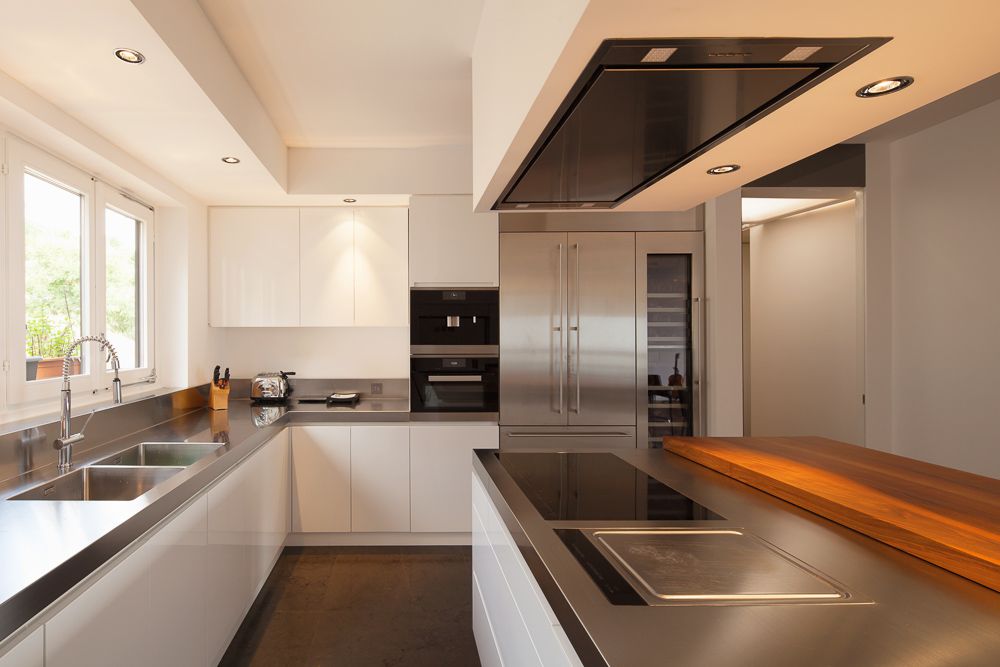
Stainless steel, the unsung hero of kitchen countertops, is a sleek and modern choice that’s gaining popularity for good reason. This durable material, most commonly found in commercial kitchens, offers a blend of functionality and style that’s hard to beat.
| Pros | Cons |
| Durability: Stainless steel is highly resistant to stains, corrosion, and heat, making it extremely durable and long-lasting. | Appearance of scratches: While stainless steel is resistant to scratching, it can still show scratches and dents over time, detracting from its aesthetic appeal. |
| Hygienic: Its non-porous surface makes it easy to clean and prevents the growth of bacteria, making it a hygienic choice for kitchen countertops. | Noisy: Stainless steel countertops can produce more noise when items are placed on them compared to other materials like stone or wood. |
| Modern aesthetic: Stainless steel countertops offer a sleek and contemporary look that complements various kitchen styles, from industrial to minimalist. | Prone to water spots: Water spots and fingerprints are more visible on stainless steel surfaces, requiring frequent wiping to maintain their appearance. |
Kitchen countertop materials #9: Wood
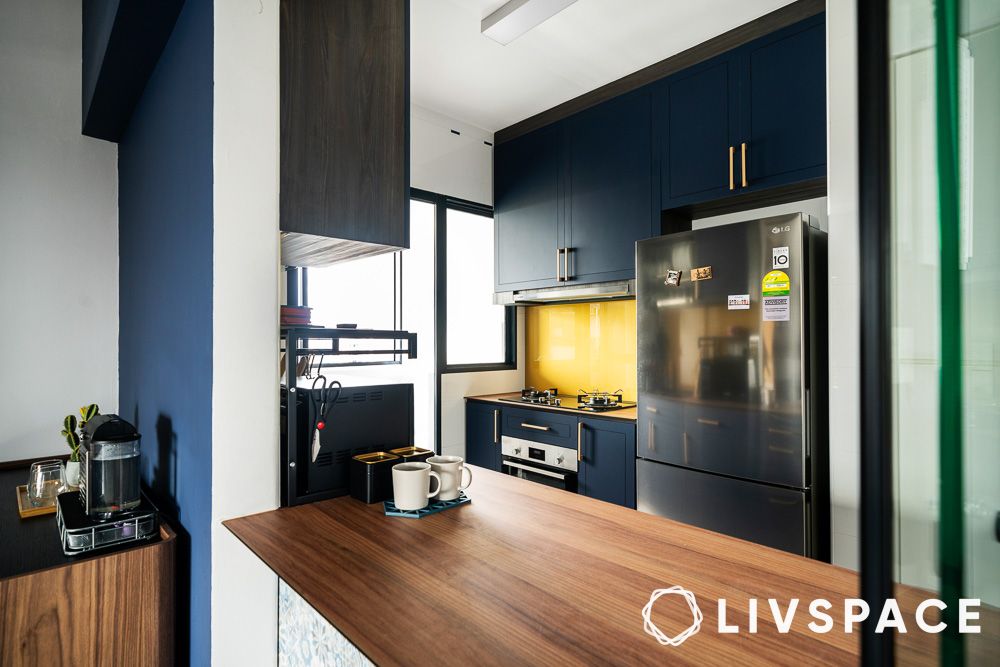
Wood, a timeless and natural choice for kitchen countertops, brings warmth, character, and a touch of rustic charm to any culinary space. Unlike manufactured materials, wood countertops offer a unique and organic aesthetic that evolves over time, developing a rich patina with age. From classic butcher blocks to elegant hardwoods like maple and walnut, wood countertops offer both visual appeal and practical functionality, making them a beloved choice for kitchens of all sizes and styles.
| Pros | Cons |
| Natural aesthetic: Wood countertops offer a timeless and organic look, adding warmth and character to the kitchen. | Susceptible to damage: Wood countertops are prone to scratches, dents, and water damage if not properly sealed and maintained. |
| Warmth: Wood countertops provide a cosy and inviting atmosphere, making the kitchen feel more welcoming. | Vulnerable to heat and moisture: Wood can be damaged by excessive heat and moisture, requiring careful use and maintenance. |
| Repairable: Minor scratches and dents can be sanded out and refinished to restore the countertop’s appearance. | Prone to bacterial growth: Without proper maintenance, wood countertops can harbour bacteria, requiring regular cleaning and disinfecting. |
Kitchen countertop materials #10: Soapstone
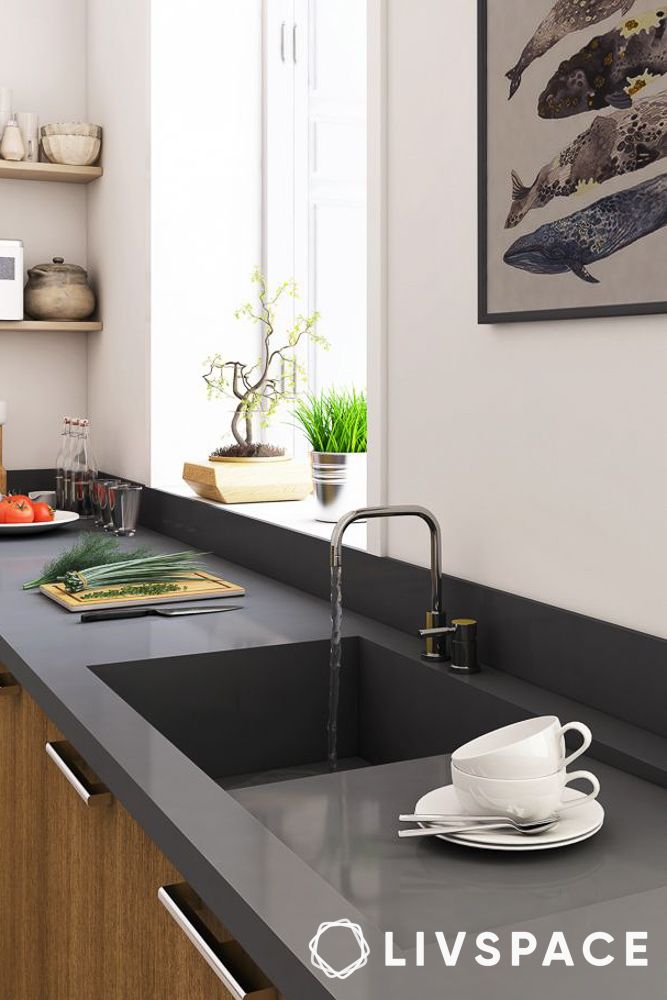
Soapstone, a natural stone revered for its timeless elegance and practical durability, emerges as a sophisticated choice for kitchen countertops. With its distinctive matte texture and rich, deep hues ranging from soft grey to charcoal, soapstone adds a touch of understated luxury to any culinary space.
| Pros | Cons |
| Heat resistance: Soapstone is highly resistant to heat, making it ideal for placing hot pots and pans directly on the surface without causing damage. | Regular maintenance required: Although resistant to stains, it requires regular maintenance, including periodic oiling or waxing to maintain its lustre and colour. |
| Stain resistance: Its non-porous nature makes soapstone naturally resistant to stains from spills and liquids, simplifying cleaning and maintenance. | Limited colour options: Soapstone is available in a limited range of colours, primarily varying shades of grey, which may not suit all design preferences. |
| Natural antibacterial properties: Due to its dense composition, soapstone possesses natural antibacterial properties, contributing to a hygienic kitchen environment. |
Wondering how to choose the right kitchen cabinet? Check out: Kitchen 101: How to Choose the Best Kitchen Cabinets in Singapore
How can Livspace help you?
We hope you found this guide on kitchen countertop materials useful. Tackling a kitchen renovation project can be hard. Lucky for you, our team of seasoned and creative designers is ready to collaborate with you to bring your visions to life. Book an online consultation with Livspace today.
- We have delivered over 20,000 happy homes
- High-quality and durable materials with assured 215-quality checks
- Reliable timelines with project tracking
Get experts to create your dream home. Visit our Experience Centres at Suntec City, Ubi, Balestier and East Coast.
Disclaimer: While choosing the right countertop material depends on your preferences and requirements, Livspace recommends granite, engineered quartz, sintered stone, terrazzo, marble and KompacPlus as they are comparatively more durable and easy to maintain.
All contents of the story are specific to the time of publication. Mentions of costs, budget, materials, and finishes can vary with reference to current rates. Additionally, the designs showcased within the story are subject to availability and will vary based on the year the homes were designed in. Consult our designers for more details on the latest designs, pricing and availability.


